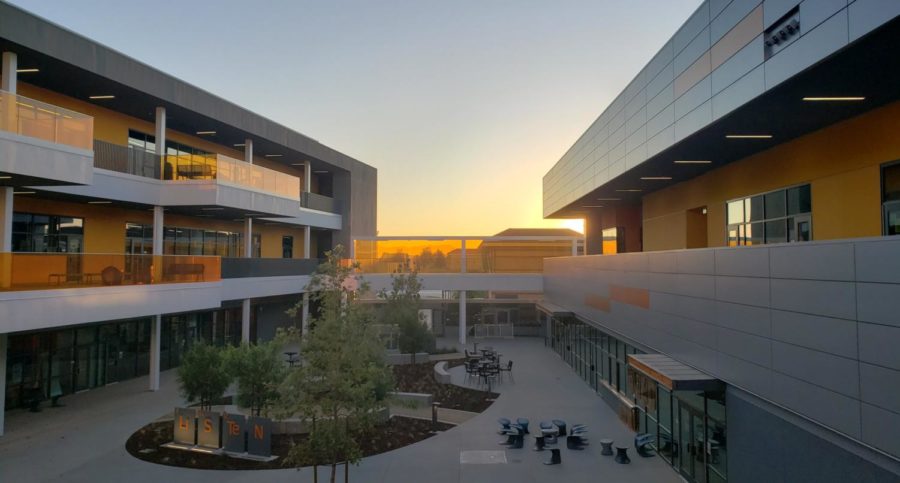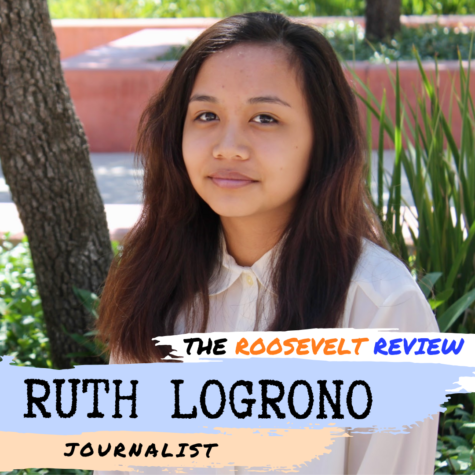On Education and Identity: A Personal Essay
On the steps of the eSTEM building, just beyond the orange bridge wall, the shape of a main campus building can just barely be made out, with the morning sun rising behind.
October 11, 2019
School (noun): A source of knowledge.
High school. Its time in any one life can be described as many things: wonderful, exciting, terrible, stressful, never-ending. In the PowerPoint presentations, it’s a time of growth, development, change. But in film, TV, and novels, it is, first and foremost, a scene set for drama. These mediums love to explore the spectacle of the high schooler’s landscape, love to portray it as this dense maze of forest, full of crawling vines and branches waiting to be tripped on, waiting for the moment a hormonally confused and socially anxious teenager takes a wrong step. In these fictional worlds, the cliques that loiter in the hallways are packs of animals, always assessing each other, a low growl perpetually perched on the edges of their throats. It is brutal.
And fictional.
This is the type of movie that is played at sleepovers, during the warm, lethargic moments where simple entertainment is the goal, not realism, not thought-provoking wisdom. It does not accurately represent real life. In the movies, the idea of the “clique” is an essential staple for the high school cliché, but they’re rarely ever seen with the same level of exaggeration in real schools.
I myself never felt I was part of any clique. Yes, I always roamed within the same group of people, never made a real effort to stray far from the confines of my elementary classroom, but we were never too reluctant of letting other people in, should they ask for it. Humans are social creatures, whether we like it or not; it is always a nice feeling, to make a new friend. It is always a nice feeling, to find someone to relate to. In those early days, differences were not scorned at, new ideas for playground games were always considered. But exclusion can be subtle, patient. It can slither underneath your feet, silent, waiting for the moment you start to grow up.
And when exclusion does start to show its face, it is not always loud and colorful. This is real life, after all. Not a high school drama movie.
We fast forward to eighth grade. It was nearing the end of the school year, the time to start choosing what classes I’d take the next year; freshman year. In my mind were hopes and worries: hopes for all the things I’d learn, the experiences I’d create, worries for all the people I’d meet, the conversations I’d have. And next to these, there was a thought, a whisper, one that poked and prodded, an idea: the eSTEM program, a pathway to the future.
The flyers told me all I needed to know. The preparation, the opportunity, the head start to my career. I thought of all the times, in both elementary and middle school, when my math teachers would award me for my outstanding performance, when they would let me stand on a stage as they read out my name, my parents smiling at me from the sidelines. I thought of space, and the stars, and the deep unknown. I wrote an essay. I got accepted.
In the months following, I would be shown a chart, outlining the classes I would take for the next four years of my life; I would prepare, perform, and present a truly awful science fair project; I would make new friends, real friends, the true beginning of my social journey. We’d work together on homework, commiserate over embarrassing moments, exchange stories and pieces of ourselves. But mostly, we’d laugh.
Our jokes, our games, our foolishness, it was constant. STEM connected us, gave us common ground. “The STEM community is my family,” said junior Edeina Castillo. “We got something to relate to, we’re all bonding with this. We’re all bonding!”
We created inside jokes, invented new terms. The origins of the labels “stemmie” (a student who’s in the STEM program) and “normie” (a student who is not) can be traced back to that period, that feeling of camaraderie that would only increase and intensify with time. They were words used exclusively by us, words that we took great joy in using. “None of the normies call us stemmies, they just call us STEM students,” said Mikhaela Malacon, junior.
Our quiet exclusion was accompanied by the lifted corners of our lips, the delighted tinge in our laughs. We were high school freshmen with clumsy feet and even clumsier tongues; teasing was our most-used language. I was never too hesitant to participate.
Because in the midst of these new, wonderful things I’d gained, these hopes I’d ignited, I was still so unsure, so confused. Computer science and engineering was my plan, reliable and sure. I would be able to touch the stars, if not with my own hands then with the programs I would help to build. I would be steady, my paychecks never in danger of being taken away by redundancy, by a bot who could do it better. I would be part of the present’s advancement into the future. I knew all of this, told this to myself every day, but still I wasn’t satisfied. I didn’t enjoy this box I had fenced myself into.
And so, in my own denial and attempts to self-soothe, I began to create an island for myself, frantically tried to keep the walls of the identity I had trapped myself in standing. The conflicting tides within me formed a mound of land beneath my toes, lifting me to a false sense of precedence. STEM was my pedestal, my hill to stand on. I thought that because I was doing this, because I was studying this, planning my life around numbers and statistics and technology, I thought I would go further, I would go higher, I would be better, than everyone who wasn’t on this same path.
It was easy, to think in this hasty, frenzied way. It had been ingrained in me, this link of intelligence to proficiency with numbers, to the proof of an award, to the letter ‘A’ on a report card.
It was simpler. There was always a clear distinction between right and wrong. Smart and stupid.
I would eventually come to drop out of the STEM program. I took a break from it by transferring myself to an online school for sophomore year, and during that time, I started to write. Shadows of ideas, occasional short stories, a few lines of imagery; scribbled on scraps of paper, piled into an organized chaos. I wanted to learn everything about this exhilarating medium of the written word, of storytelling. I practiced it in my every waking moment, practiced extracting material from the fragmented thoughts that would skitter in my brain, practiced building spaceships out of the dented, dirty ore, practiced withdrawing emotion from the glint of their windows in the early morning light.
(I will probably never fulfill my original dream of working for NASA, but I’ll still get to touch the stars every once in a while, with fingertips to keyboard, pen tip to paper, celestial bodies orbiting the space between.)
Writing saps away at me like nothing else can. It is exhausting, excruciating, worse than any form of torture, it is the poison that slowly eats away at my sanity. And I am so in love with it, I can hardly breathe for the smoke this fire inside of me creates.
So while my friends may sometimes tease me about “joining the normies,” I will never be tempted to climb back up that hill again. I didn’t have ambition while I was up there, not really. I wasn’t interested in learning more about technology, or engineering, I was interested in learning what I’d have to do to get a degree, to start making money. It is motives like those that lead to dead ends, lead to a hill summit with nowhere else to turn except down.)

The physical divide between eSTEM and ERHS.
It was my growing passion for language manipulation that convinced me to step away, step back off my island, take a wider look at this precarious land that we call education. This divide between “stemmies” and “normies” started long before there were plans in place for a separate eSTEM academy. Students, from the very beginning, are guided towards success, a goal so broad that it becomes claustrophobic, leads to confusion fenced in on a tiny island. It is not until later that these failures become starkly apparent, these lessons that were neglected to be taught, like how to build a fire inside you, how to race headfirst into something and become its most ardent explorer.
I was talking with a friend who’s in STEM the other day, and she told me something interesting. “Ever since I’ve been making the effort to really learn instead of just doing the work for the grade, I’ve been doing a lot better in school.
“I feel like I’m actually gaining something from my classes.”
So maybe some of the high school drama movies got one thing right. Find something that makes you breathless, something that fuels your embers into a roaring smoke, something that you truly want to learn about, and fly a ship out into the very deepest corners of its uncharted territory. It is there, in the unending discovery of things unknown, where humanity will always unite.



Joshua Dineros • Oct 12, 2019 at 11:42 am
This is truly an amazing article Ruth. I loved hearing your story, and how you connected it to every single voice whether it be an eSTEM voice or an ERHS voice, to what we all know and experience. Keep it up :’)